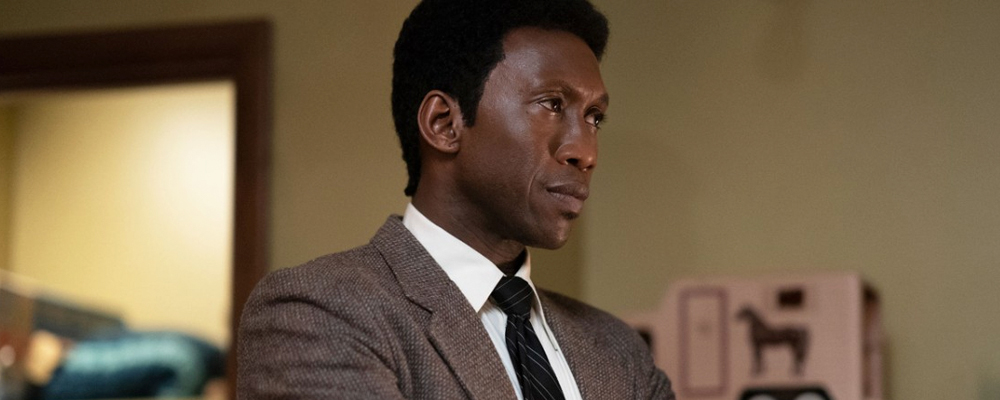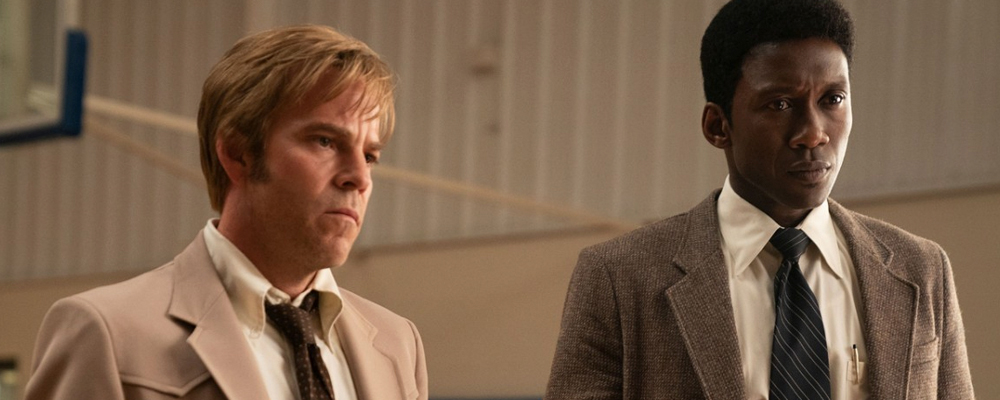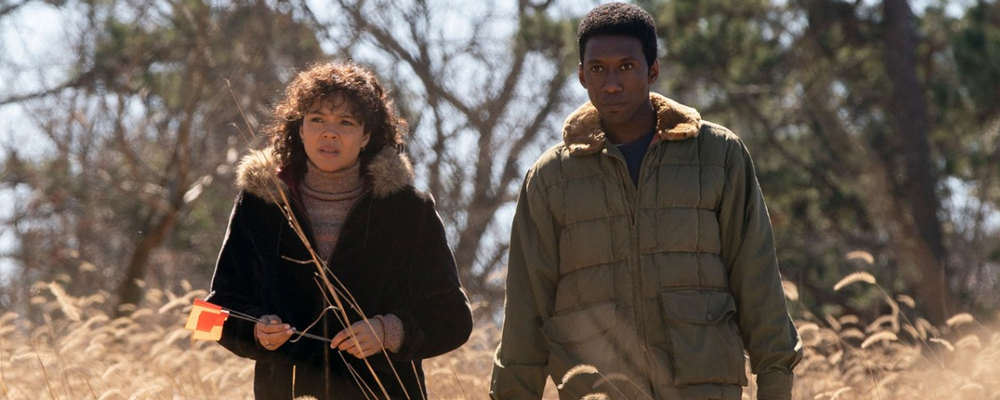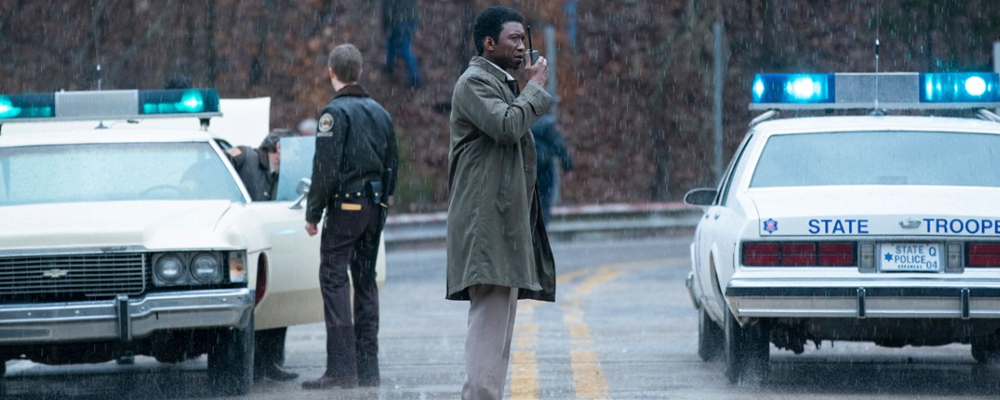‘True Detective’ Returns to Its Roots in Season 3
Tony Sokol
Season three of “True Detective” brings Nic Pizzolato‘s suicide-by-cop obsession back to HBO. There is actually only one suicide by cop in the entire series, but the author can’t get his mind out of the depths to which cops will go to make a collar that sticks. He also doesn’t shy away from what cops will do just to kill time. In the very first scene we see the Arkansas pain-clothes officers on duty in their sleepy town, they shoot rats until they finally decide it would be more fun to bring someone in and beat the shit out of them.
The two cops, detectives Wayne Hays played by Mahershala Ali, and Roland West played by Stephen Dorff, are again on the homicide beat. This is actually quite a saner step than either of them had in their last gig, soldiering in Vietnam. They learned some mad skills in the jungles of Southeast Asia and translate the signs for easy reference in the deep, dark woods of the Ozarks. Even during the midday sun, the trees hide a deep shade. The season focuses on a local investigation of two missing kids, a brother and a sister played by Phoenix Elkin and Lena McCarthy. One of their bodies is discovered, the other is missing and presumed dead. But make no presumptions. While the only occult reference in the first five episodes is a comment about a Black Sabbath T-shirt, mysteries abound.
The actual abduction of the two kids, or the day they went missing because kids are kids and even the best behaved keep secrets from their parents, happened on Friday, November 7, 1980, the day Steve McQueen died. The series flows between the original investigation, an investigation into the investigation and conviction which happened ten years later, and today. One of the cops is appearing in a documentary about the case.
The series merges the three timelines seamlessly. You don’t need to adjust, you just have to follow. Pizzolato does this by letting the main points of the season spill out from the three different time frames. The slices of time interact with each other, answer questions left over from a previous segment. Although, to be fair, once the narration is set and the viewer is accustomed to how things are going, the questions tend to linger longer. This is actually a great tactic for suspense. We get instant answers while we get into the show, and then the space between a clue and what it means starts to move away from each other. It is deliciously torturous. There are times you might think you missed something. You didn’t. The directors are messing with you. And it works.
Pizzolato’s still got a fetish for fetishes. The first season introduced viewers to the diabolical devil traps which were placed in sacredly geometric patterns around all things related to the series of murders the two cops were investigating. This season has straw dolls, homemade poppets you might find at a flea market or church fair. Detective Hays finds quite a few of them near a crime scene.
Mahershala Ali is emotionally and narratively effective. His face is a canvass which can project his innermost thoughts. Ali is best known for his roles in Netflix’s “House of Cards,” “Spider-Man: Into the Spiderverse,” the “Hunger Games” films and his Supporting Actor Oscar-winning turn as the drug dealer Juan in 2016’s “Moonlight.” He may nab another statue for tinkling the ivories as Don Shirley in “Green Book.” His character, Wayne Hays, spent a lot of alone time in the jungles of Vietnam, probably doing the same kinds of unthinkable things that got a hit put on Marlon Brando’s Colonel Kurtz in “Apocalypse Now!.” Dubbed “Purple Hays” in the war, he is an A-1 tracker. For such a hardened professional law enforcement authority, he is an extremely vulnerable human being. His pains, angers, jealousies and frustration are telegraphed through blinks and sidelong glances. Ali’s subtle muscle control has nothing to do with gyms and workouts. His body language tells stories his mind doesn’t want his mouth to have anything to do with. Whether he is battling the institutional racism of the State Police force or the elusive memories he needs to wrestle to move forward, he lets it all slip through a thousand razor blade slices only he can see.
Hays’ partnership with detective Roland West, played by Stephen Dorff, is the best pairing since Matthew McConaughey and Woody Harrelson’s Louisiana State Homicide Unit detectives Rust Cohle and Marty Hart. Dorff is a personal favorite of this writer since he came out of “The Gate” in 1987, having played the Beatles’ bassist Stuart Sutcliffe in the biopic “Backbeat,” and starred in John Waters’ cult sleeper “Cecil B. DeMented.” Cohle and Hart had a disconnect which infused their conversations with tensions, and their chemistry was the stuff of dangerous and lethal interactions. Cohle and Hays both go off the grid for their investigations. It is where they can shine without reflection.
Hart and West both trust the darkness each of their partners has to undergo in order to bring back the goods. They have confidence in their abilities. During season 1, Hart did think Cohle went a tad too far afield in his presumptions, skirting close to tainting his probe to prove this theories. Not so with West. His trust and admiration for Hays is complete. The only problem he has with guy who rides shotgun is that Hays is a little too uppity with the higher echelons of law enforcement. West believes Hays is absolutely correct in his conclusions, but could work on his delivery. He knows Hays faces a double jeopardy in the force because of racial biases, and even admittedly inserts himself as an example during conversation, but he understands and appreciates both the uphill battles this brings and remains fully supportive.
West also likes his partner. He genuinely enjoys his company, even when he’s angry over things he can’t remember root causes to. Maybe not so much when Hays wants to dredge up old cop work and the frustrations of protocol. But to sit and have a drink, watch a game and talk of human things? West would be as thrilled as he was when he finally had the clout to bring his old partner on in a task force formed a decade after the missing kids case to reinvestigate the arrest and conviction.
There is a very sweet, and yet bittersweet romance at the center of “True Detective” season 3. There are no tawdry affairs with these two cops. West fancies himself a minor player, a single man having fun who has no problem using his policeman’s notebook as a pickup line. Hays thinks he’ll never get married, but winds up falling in love on the job in spite of himself. Both men take their dates on dates, dinner and the like. West sees himself as a feminist, offering such sage advice as “show a woman you have kitchen skills and they know you’re not looking for a cook.”
Amelia, hypnotically underplayed by Carmen Ejogo, is a teacher at the grammar school the two missing children attended. She helps with the case, even doing a little undercover work of her own, and writes a book about it. Tom (Scoot McNairy) and Lucy Purcell (Mamie Gummer), the parents of the missing kids, are damaged long before their children miss a sundown curfew. The Ozarks are also a character, lovingly photographed even during horrifying displays.
One of the suspects, who becomes pivotal in a phenomenal action sequence, a scrappy trash collecting ex-vet named Brett Woodard (Michael Greyeyes), has one of the best and most human lines in the show. Asked if he likes children in a town where children are feared murdered, he responds “what is the right answer to that? I have children.” Having recently seen “The Simpsons'” first Christmas special “Simpsons Roasting on an Open Fire,” this reviewer is reminded of Homer’s answer to that question when taking department store Santa training, “you mean all the time?” Woodard’s children, all grown up and hurting, come to his defense a decade after the crimes and the original unsatisfying courtroom conclusion.
“True Detective” season 3 also mines the menace of the community. When the children disappear neighbors are encouraged to turn in neighbors, community centers are advised to fire predatory employees, who are targeted for strong-arm tactics by the detectives. The brass and the public relations department get in the way of the investigation and the FBI winds up with the juiciest bits of intel. Interdepartmental squabbles are kept to a minimum, but the machinations of policing are, as always, the most intriguing part of “True Detective.” The show is a police procedural at heart, but the beat is off, as is the polite veneer. This is why we watch.
It’s been three and a half years since “True Detective” season 2, which starred Colin Farrell, Rachel McAdams and Taylor Kitsch as the law enforcers, and Vince Vaughn as the central scofflaw. The sophomore season only paled in comparison with the first, it was still an original take on a sturdy standby. You have to butt heads and break rules and skulls to crack hard cases. “True Detective” season 3 is a return to the roots of the first season.
“True Detective” season three premieres Jan. 13 and airs Sundays on HBO.




